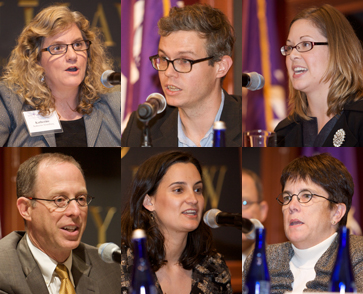Experts spar over privacy, GPS tracking, and other surveillance technology at the LAA Fall Lecture (VIDEO)
During the Law Alumni Association’s Annual Fall Lecture on November 10, a panel of experts discussed the legal issues surrounding location data, tracking technology, and consumer privacy law. The panel, which was moderated by Professor Katherine Strandburg and included a former general counsel the FBI, as well as individuals from the Center for Democracy and Technology, the ACLU, the FTC, and Verizon, debated the needs for new privacy regulations in an environment of rapidly evolving technology.
Justin Brookman ’98, director for the Center for Democracy and Technology’s Project on Consumer Privacy, and Molly Crawford, a senior attorney with the Division of Privacy and Identity Protection at the FTC, started off the event with a background discussion on legislative efforts to regulate commercial use of location data.
 “Ten years ago, the only companies that knew your real time location were your cell carriers,” Brookman said. “Now Angry Birds, ESPN, and whoever else I download can have access to it.” Brookman argued that the lack of location privacy can lead to real harm, whether through the applications that individuals can load onto one another’s mobile devices, or through changing the ways in which companies interact with consumers. “Would you have a problem with lots of companies tracking what you do to decide what prices to offer you?” he asked the audience rhetorically.
“Ten years ago, the only companies that knew your real time location were your cell carriers,” Brookman said. “Now Angry Birds, ESPN, and whoever else I download can have access to it.” Brookman argued that the lack of location privacy can lead to real harm, whether through the applications that individuals can load onto one another’s mobile devices, or through changing the ways in which companies interact with consumers. “Would you have a problem with lots of companies tracking what you do to decide what prices to offer you?” he asked the audience rhetorically.
Crawford, who investigates and prosecutes violations of U.S. federal laws governing the privacy and security of consumer information, described the FTC recommendation of creating a “Do Not Track” option for users, a mechanism by which users would be able to opt out of data tracking. This option, she argued, would need to be universally implemented and easy to use. “What we want to see is privacy that is baked in, part of the process, that is not an afterthought,” she said.
However, Randal S. Milch ’85, executive vice president and general counsel of Verizon, warned that legislation might not be quite so easy to implement. “Attempts to legislate in this area are very freighted with the inability to keep up with technology,” he said. He also argued that part of the difficulty with creating privacy legislation is that the generation creating privacy laws is not the generation most commonly using new technologies. “We try to lock these kids into a regime based on old fogies’ views of what’s private and what’s not private,” he said
In the second half of the event, Valerie Caproni, former general counsel to the FBI and currently vice president and deputy general counsel of Northrop Grumman Corporation squared off with ACLU staff attorney Catherine Crump over the criminal justice implications of GPS data tracking. In particular, they discussed the ongoing Supreme Court case, United States v. Jones, which addresses whether the Constitution allows for police to use a tracking device on a car without warrant or permission from the owner, and whether the fourth amendment is violated when the police use a tracking device in order to keep track of the car’s location over a period of time.
Caproni, who described herself as “the token jack-booted thug for the purpose of this discussion,” argued that the use of GPS tracking by the police and the FBI is not a violation of fourth amendment rights. “When you’re out on the public street, you do not have a reasonable expectation of privacy, because you can be seen by the public eye,” she said. According to Caproni, GPS location tracking accomplishes the same goal that 24 hour surveillance by several FBI teams would accomplish, just with much more efficient use of manpower.
Crump, however, took exception to Caproni’s argument, saying, “I have never known the fourth amendment to protect efficient law enforcement techniques for efficiency’s sake.”
Throughout the event, Crump also stressed the importance of taking into account the fast-changing nature of technology, whether in consumer privacy regulation or criminal justice legislation. “If you had said in 1984 that in 25 years every American would carry a tracking device, you would have been dismissed as crazy. Someone would have handed you a tinfoil hat, or you would have concluded that the Soviets had won the cold war,” she said. “But that’s the reality that we live in today.”
Watch the full video of the event (1 h 52 min):

